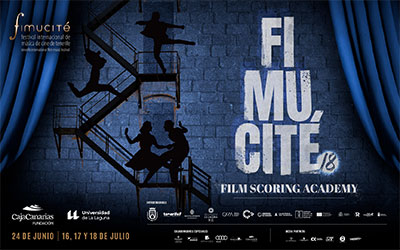FIMUCITÉ FILM SCORING ACADEMY 2024

FIMUCITÉ maintains its commitment to continue specialised training in the field of music for audiovisuals. During past editions, we have explored original scores created for image in its various forms, whether that be feature films, short films, documentaries, video games or any other kind of audiovisual work. All of this, as well as the analysis and state of the current industry, has been the territory through which recognised professionals of extraordinary international prestige have become instructors in the art of “Film Scoring.”
Since 2016, FIMUCITÉ Film Scoring Academy has been offering a varied audience, both those training and professionals in the field, a wide catalogue of master classes that have addressed multiple and varied disciplines related to this art form.
This initiative, which celebrates its ninth edition in 2024, is one of the most unique academic offers within the European spectrum in the field of music for audiovisuals. This is especially the case this year, when our academy opens to the general public. For four days, fascinating aspects related to the festival and musical cinema, the theme around which the 18th edition of FIMUCITÉ revolves, will be explored. We will get to know, in depth, the details and secrets of those titles whose scores we will be able to enjoy live at our concerts. A unique opportunity to enter the wonderful universe of music for audiovisuals.
REGISTRATION PERIOD OPEN. LIMITED PLACES
If you have any questions or queries, please contact us at fsacademy@fimucite.com
18.00 to 20.00 «FIMUCITÉ: 18 Years of History of the Oldest Film Music Festival in the World»
 Talk given by Diego Navarro
Talk given by Diego Navarro
The Film Scoring Academy kicks off its series of talks with renowned Canarian composer Diego Navarro, the islands' most relevant composer in the field of film music. In this masterclass, Navarro will share his knowledge and experience in the world of music for film, highlighting his personal and professional career, and sharing details about his creative processes, influences and experiences in creating music for numerous film productions.
As founder and director of the Tenerife International Film Music Festival (FIMUCITÉ), Navarro will take us on a journey through the festival's history with a spotlight on its “greatest hits”, collaborations with big names in the industry and the unforgettable moments that have marked its evolution.
This masterclass is a unique opportunity for students, professionals and lovers of film music who wish to be inspired and acquire valuable knowledge in this field.
18.00 to 20.00 «Composing for the stage or staging for the music?»
 Talk given by Leandro A. Martin
Talk given by Leandro A. Martin
In audiovisual language, the relationships between music and image are not always static and predictable. Among the multiple factors that influence, contextualize and define this interrelation we can include: the historical moment, the director-composer team, the use of pre-existing music or music composed ad hoc, the link between the script and the music, the formal functionality of the soundtrack, diegetic music vs. extradiegetic music, and so on. In this introductory lecture, we will take a journey through some of the reciprocal proposals between visual and auditory stimuli that cinema proposes to construct a narrative.
Leandro A. Martin is a composer and teacher and researcher of Didactics of Musical Expression at the University of La Laguna. He has premiered works and given conferences in countries such as Germany, Cuba, Italy, Argentina, Spain and England.
16.30 to 18.00 «Cabaret, a modern classic»
 Talk given by Isabel Castells Molina
Talk given by Isabel Castells Molina
The film Cabaret, by Bob Fosse, is based on Goodbye to Berlin, the novel by Cristopher Isherwood, which inspired him to create a considerably off-beat revision of the musical genre. In this particular analysis of the film, we will focus on the diegetic function of the songs and choreography, which illustrate the evolution of the characters and the plot itself, from the initial hedonism of Berlin nightlife to the horrors of Nazism. Through the analysis of dialogue and musical numbers, we will break down the complexity of the characters, especially that of the protagonist Sally Bowles, simultaneously independent and fragile, in whom today's women can see themselves reflected.
Cabaret is a bittersweet, festive and dark musical, and its magic lives on to this day. It is also a mirror that simultaneously reflects the conflictive world of the 1930s and that of today, as it addresses issues such as sexual dissidence, abortion and xenophobia, and it reflects the eternal struggle between repression and freedom, and, essentially, between the individual and the political-social context that conditions their existence. All of this is achieved through musical themes that are already part of the collective imagination because, indeed, “life is a cabaret.”
Isabel Castells Molina, Professor of Spanish Literature at the Department of Spanish at the University of La Laguna and Cultural Development and Library Secretarial Director at the University of La Laguna. She teaches the subject “Literature and Cinema” and has dealt with the relationships between both disciplines in articles, book chapters and conferences.
18.00 to 19.30 «What Film Composers Can Learn From Songwriters»
 Talk given by Andy Hill
Talk given by Andy Hill
Film music shares a historical lineage with musical theater and operetta by way of Vienna and “founding fathers” like Max Steiner, and it’s not by chance that the first generation of great film composers looked to the stage for inspiration. There is something about the presence of larger-thanlife characters on the screen acting their part to the accompaniment of a musical score that calls for the use of themes that sometimes recall showtunes more than symphonies. And from “Tara’s Theme” to “My Heart Will Go On,” it’s been those sweeping anthems of love and longing that often ensure a place for the film in the memory of the audience.
It’s in every film composer’s interest to study the art of popular song, and particularly the standards of musical theater and its cinematic adaptations, from “You’ll Never Walk Alone,” “My Favorite Things,” and “Maria” to “Send In The Clowns” and “Memory.” We will deconstruct some of the best ones and discover that even at a time when melody seems not to be the cornerstone of film music, a good motive and a compelling set of chords can still get you a long way.
16.30 to 18.00 «The Evolution of the Musical»
 Talk given by Paco Dolz
Talk given by Paco Dolz
Silent cinema made a great use of music and, once sound was incorporated, it adopted the musical genre as a spectacle. It was the era of great visual creators such as Gene Kelly, Busby Berkeley or Fred Astaire, where the important thing was the music and the choreography. In 1927, Oscar Hammerstein, with "Show Boat", set out the rules of the theatrical musical as a genre, ensuring that the songs were not just a break in the action, but actually moved the story forward.
The success of the team of Oscar Hammerstein and Richard Rodgers (The King and I, The Sound of Music) gave way, among others, to Frederick Loewe and Alan Jay Lerner (My Fair Lady, Paint Your Wagon); Fred Ebb and John Kander (Cabaret, Chicago) or Jerry Bock and Sheldon Harnick (Fiddler on the Roof, She Loves Me). Special mention goes to those who are both musicians and lyricists such as Cole Porter (Anything Goes, Kiss me Kate), Jerry Herman (Hello Dolly, La Cage aux Folles) or Stephen Sondheim (West Side Story, Sweeney Todd).
Another important moment for the theatrical musical was the landing on Broadway of the international Andrew Lloyd Webber (Evita, The Phantom of the Opera - England), Claude Michel Schonberg (Les Misérables, Miss Saigon - France), Elton John (The Lion King, Billy Elliot - England), or Tim Minchin (Matilda, Groundhog Day - Australia), who ended the monopoly of Americans in the world of the musical.
And we will cover the current landscape, with the explosion of non-musical films (Back to the Future, Ghost) that have been brought to the theatre in the form of musicals, and musicals that were born as musical films (La La Land, The Greatest Showman), whose success will inevitably take them to the stage.
This is a chance to get to know the most legendary musicals in film history, which will then be enjoyed at the “A Million Dreams” Gala Closing Concert on Saturday, July 20th.
.18.00 a 19.30 «Roundtable»

Film and music lovers are invited to participate in a very special event, an exclusive Q&A with awardwinning composer Justin Hurwitz and other notable guests. In this one-of-a-kind session, attendees will have the opportunity to delve into the fascinating world of film music composition, focusing on the hit film La La Land.
From the secrets behind the melodies to the creative challenges of production, this event will provide a privileged view of the creative process behind one of the most emblematic films of recent years.
This Q&A is the perfect complement before enjoying the LA LA LAND in Concert “Live to Picture” experience on Friday, July 19th, as part of the Festival programme.